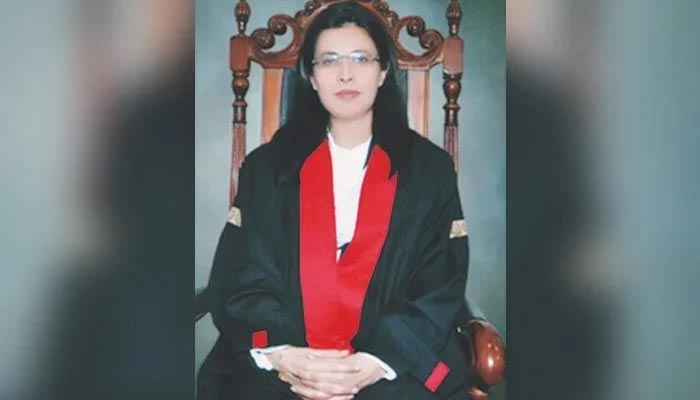Justice Ayesha Malik makes history, elevation to Supreme Court confirmed
Justice Ayesha will be sworn in as the first woman SC judge of Pakistan on Monday, January 24
January 21, 2022

- President Alvi approves appointment under sub-section one of Article 177 of the Constitution.
- Justice Ayesha becomes first female Supreme Court judge in the judicial history of Pakistan.
- Justice Ayesha will be sworn in as the first woman judge of Pakistan on Monday, January 24.
ISLAMABAD: President Arif Alvi on Friday gave final approval to the elevation of Lahore High Court Justice Ayesha Malik as a judge of the Supreme Court.
Justice Ayesha will make history as the first female Supreme Court judge in the judicial history of Pakistan. She will be sworn into the office on Monday, January 24, and tenure will begin immediately. Chief Justice of Pakistan Gulzar Ahmad will take oath from Malik.
Her oath-taking ceremony will be held at the Supreme Court. Judges of the Supreme Court, the attorney-general of Pakistan, and the advocate general will be in attendance.
A notification issued by the Ministry of Law and Justice said President Alvi had approved her appointment under sub-section one of Article 177 of the Constitution.
The president's approval follows a formal go-ahead to the promotion from the Parliamentary Committee on Judges Appointments this past Wednesday.
The committee, under the chairmanship of Law Minister Farooq H. Naek, had decided to approve Justice Ayesha's elevation after the Judicial Commission of Pakistan finally acquiesced to her nomination.
The Judicial Commission of Pakistan had on January 7 approved the elevation with a vote of five for and four against after a heated discussion on whether judges should be appointed based on merit or seniority.
It is pertinent to mention here that Justice Ayesha Malik is ranked fourth in the Lahore High Court in terms of seniority, but is widely respected as a capable judge.
Law Minister Naek had said while approving the nomination that the court was not abolishing the procedure to appoint judges based on seniority, but Malik's appointment as first woman SC judge "would benefit the country".
Justice Ayesha Malik has been nominated to take the seat being vacated by Justice Mushir Alam following his retirement on August 17.
Her appointment had been suggested by the Chief Justice of Pakistan and the Chief Justice of the Lahore High Court. Justice Ayesha had subsequently agreed to the elevation in writing.
Born in 1966, Malik completed her basic education from schools in Paris, New York, and Karachi, according to the LHC's website.
She completed her BCom from the Government College of Commerce and Economics, Karachi, and studied law at Pakistan College of Law, Lahore.
She did LLM from Harvard Law School and has also worked with Fakhurddin G Ebrahim. Justice Malik has appeared in the high courts, district courts, banking courts, special tribunals, and arbitration tribunals.
The justice was called upon as an expert witness in family law cases conducted in England and Australia involving issues of child custody, divorce, women's rights, and constitutional protection for women in Pakistan.
Landmark two-finger test judgement
Justice Malik gave her landmark judgment back in June 2021 when she had declared virginity tests for examination of sexual assault survivors “illegal and against the Constitution of Pakistan."
A single bench led by Justice Malik announced the verdict in a set of petitions, filed in March and June 2020 by rights activists along with a PML-N lawmaker.
In the 30-page judgment, the judge wrote that the two-finger test (TFT) and hymen test have no medical basis or forensic value in cases of sexual violence and declared that virginity tests “offend the personal dignity of the female victim and therefore is against the right to life and right to dignity enshrined in Article 9 and 14 of the Constitution”.











